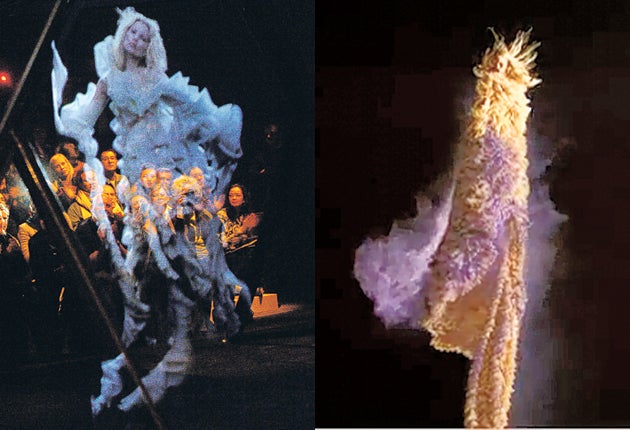Cadbury's, their Kate Moss hologram – and a lawsuit from beyond the grave

The Alexander McQueen Company was last night considering legal action after the confectioners Cadbury released a Flake advertisement featuring a floating female figure which allegedly resembles the late designer's famous 1996 hologram of Kate Moss.
The similarities between the advert and the spectacular hologram that appeared at the end of McQueen's autumn/winter 2006 collection, first shown in Paris in March that year, have left many in the fashion industry outraged, with friends suggesting the concept dreamt up by the designer – who died in February this year – had now been "crassly copied" for commercial gain.
A spokesman for the Alexander McQueen Company said: "We are seeking legal advice."
When television viewers see the new Flake advert, they may, for a moment at least, marvel at its inventiveness as they see an elegant model dressed in a swirling yellow dress against a dramatic black backdrop.
But for those who attended McQueen's fashion show the similarity is offensive. The swirling image, beamed as a hologram at the end of his catwalk show, hit the headlines for featuring Moss, who was mired in scandal after being caught on camera snorting cocaine.
By using the model for his sensational stunt, McQueen was considered to be rehabilitating her image in the fashion world.
The hologram was co-created by McQueen and Baillie Walsh, a film director who worked with the designer in 2006, and who is now responsible for creating the Flake advert. The advertising company Fallon enlisted Walsh for the project. The director was unavailable for comment yesterday. The dress for the commercial has been designed by Antony Price.
A Cadbury spokesman acknowledged that Walsh's past work was one of the motivating factors for hiring him but remained unapologetic over any passing similarity to McQueen's show.
"This is about Baillie Walsh's work," said the spokesman. "It was his house style that attracted us rather than any previous work he had done. The Alexander McQueen show is not relevant. His previous work was one of many of our visual references but not the only one. We would not accept the charge of imitation."
The spokesman added that the concept for the advert came from Walsh rather than from the company itself, which merely wanted the yellow dress to represent the chocolate's wrapper.
Last night, the internet and blogosphere were teeming with outraged McQueen supporters, some of whom left messages on YouTube the day after the commercial was first aired, including one which read: "I'm fuming. A corporate giant trampling over a dead man's legacy. This surely cannot be legal." Another read: "Even though it's directed by the same guy who did the Alexander McQueen hologram it doesn't mean that the hologram idea was his to copy."
A friend of McQueen's yesterday said the late designer was "always incredibly proud and protective of this idea. The fact that he cast Kate Moss for the hologram was highly significant given the public perception of her at the time."
But as far as the realities of the advertising world go, the industry is by its nature parasitic, and unapologetically so. Larissa Vince, deputy editor of the ad industry magazine, Campaign, said that in some ways, this could be taken as a tribute, instead of an insult.
"I have no idea whether they [Cadbury] were influenced by Alexander McQueen but advertising exists in order to be influenced by and ideally influence popular culture," she said. "There is very little in any creative sphere that could be considered entirely original. From time to time, people get upset that one ad is too similar to another. If you look at it another way, it exists as a tribute. There is no copyright in ideas."
Ms Vince added that the timing of the advert – so close to the death of McQueen – may have sparked the passionate response from within the fashion world.
"It's still quite close to McQueen's death and there are quite a lot of people who still feel upset by it," she said. "This advert comes at a time when it's fresh in our minds and we would would perhaps expect this reaction."
McQueen's suicide was announced on 11 February this year. He was found hanged by his housekeeper at his home in London. He died nine days after the death of his mother, Joyce, 75, to whom he was very close. His death devastated the industry; he was a famously modest, well-loved designer and one of the biggest talents in fashion. He had had a stratospheric rise since graduating from Central Saint Martins and working for Givenchy before founding his own labels.
Inspired ads or rip-offs?
* The 118 118 promo was challenged by the British runner Dave Bedford, who claimed that the ad's moustachioed stars were based on his image. He filed a lawsuit against the telephone directory company, arguing it was making money on his image without permission, a claim which was upheld although 118 118 was allowed to continue with the campaign.
* Passion Pictures, which produced the Sony Bravia advert with the colourful bunnies, would have been pleased with the plaudits it received. That is until images of an earlier-made and very similar-looking artwork called Play-Doh by LA illustrators Kozyndan surfaced. Passion Pictures MD Andrew Ruhemann has strenuously denied that his company "ripped off" the image.
Join our commenting forum
Join thought-provoking conversations, follow other Independent readers and see their replies
Comments